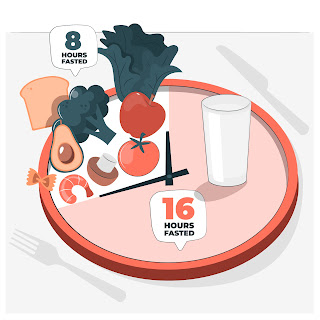Fasting—whether intermittent or extended—has become a popular topic in the health and wellness community. From claims of weight loss to increased longevity, it seems like fasting is being touted as the next big health trend. But can fasting actually be good for you, or is it just another fad?
Most people already practice a form of fasting every night. If you eat dinner at 7 PM and have breakfast at 7 AM, you're naturally fasting for about 12 hours. This isn’t a new concept. It’s simply part of our daily routine, and it’s something our bodies are naturally accustomed to. But what happens when you extend that fasting window or begin fasting for longer periods of time?
Understanding Fasting and Its Benefits
At its core, fasting is just the act of voluntarily abstaining from food for a certain period. But don’t let the word "fasting" scare you! It's not about starving yourself or depriving your body—it's about giving your digestive system a break and allowing your body to focus on other important processes like cellular repair and fat-burning.
Here’s a closer look at some of the potential benefits of fasting:
1. Weight Loss and Fat Burning
Fasting naturally encourages your body to switch from burning sugar (carbohydrates) to burning fat as its primary energy source. This shift can help with weight loss, especially when combined with healthy eating habits. Intermittent fasting has been shown to improve metabolism and reduce overall calorie intake without requiring drastic changes to what you eat.
2. Improved Digestion
When you stop eating for a period of time, your digestive system gets a break, which can help improve its overall function. During fasting, your body has the chance to repair and detoxify cells, which may help with gut health, reduce bloating, and improve nutrient absorption.
3. Enhanced Cellular Repair and Longevity
Fasting triggers a process known as autophagy, where your body breaks down and recycles old, damaged cells. This process may help reduce inflammation and protect against diseases like cancer. Some studies have also suggested that fasting could increase longevity by promoting cellular repair mechanisms.
4. Better Blood Sugar Control
Intermittent fasting can help regulate insulin levels, improving insulin sensitivity and preventing blood sugar spikes. This can be beneficial for individuals who are at risk of developing type 2 diabetes or those already managing the condition.
Fasting Myths and Misconceptions
One of the most common misconceptions about fasting is that it's dangerous or unhealthy. Some people believe you need to eat every few hours to maintain your energy levels and support your metabolism. While frequent eating may work for some, it’s not a one-size-fits-all approach.
Debunking the Fear: Fasting Doesn't Lead to Starvation
The idea of going without food for long periods can sound frightening, especially with all the "snack culture" messages we get from commercials and advertisements. But the truth is, you don’t need to snack all day to stay healthy. Our bodies are designed to handle periods without food, as evidenced by the natural fasting we do overnight.
It’s also important to note that fasting doesn't mean you have to go days without eating or undergo extreme fasting. A simple practice like intermittent fasting, where you fast for 12-16 hours each day, can offer health benefits without causing harm. Of course, if you have any medical conditions, it’s best to consult with a healthcare provider before starting any fasting regimen.
How to Start Fasting
If you're new to fasting, starting with a simple 12-hour fasting window (e.g., fasting from 7 PM to 7 AM) might be a good place to begin. As your body becomes accustomed to fasting, you can gradually extend the window to 14-16 hours. Remember, it’s important to listen to your body and make sure you’re staying hydrated and nourished during your eating windows.
Top FAQs About Fasting
-
Is fasting safe?
Yes, for most people, fasting is safe when done correctly. Start slowly with shorter fasting windows and gradually extend them if needed. However, individuals with certain health conditions should consult a doctor before starting any fasting regimen. -
Can fasting help me lose weight?
Yes, fasting can aid in weight loss by encouraging your body to burn fat for energy. When combined with a balanced diet, fasting may be an effective tool for losing weight. -
How long should I fast for health benefits?
The duration of fasting depends on your goals. Starting with a 12-hour fast (overnight fasting) is a common and effective approach. You can gradually increase your fasting window to 14-16 hours if desired. -
Does fasting hurt my metabolism?
No, intermittent fasting does not harm your metabolism. In fact, it may improve metabolic function and insulin sensitivity. -
What can I drink while fasting?
During a fast, you can drink water, herbal teas, or black coffee (without cream or sugar). Staying hydrated is crucial during fasting periods.
Conclusion
Fasting is not a one-size-fits-all approach, but it offers a variety of potential health benefits. From weight loss and improved digestion to better blood sugar control and enhanced cellular repair, fasting can be a powerful tool for improving overall health. Remember, it’s important to approach fasting gradually and to listen to your body.
So, the next time someone tells you that you need to eat every few hours to stay healthy, remember: Fasting is natural, and when done mindfully, it can be a great way to support your body’s holistic health jou


%20Foods%20That%20May%20Ease%20Your%20Pain.jpg)





%20Benefits,%20Uses,%20and%20Everything%20You%20Need%20to%20Know%20-%20Healthy%20Roots%20&%20Habits,%20Healthy%20Roots%20&%20Habits%20Blog.jpg)
%20Benefits,%20Nutrition,%20Side%20Effects,%20and%20How%20to%20Use.jpg)


No comments:
Post a Comment